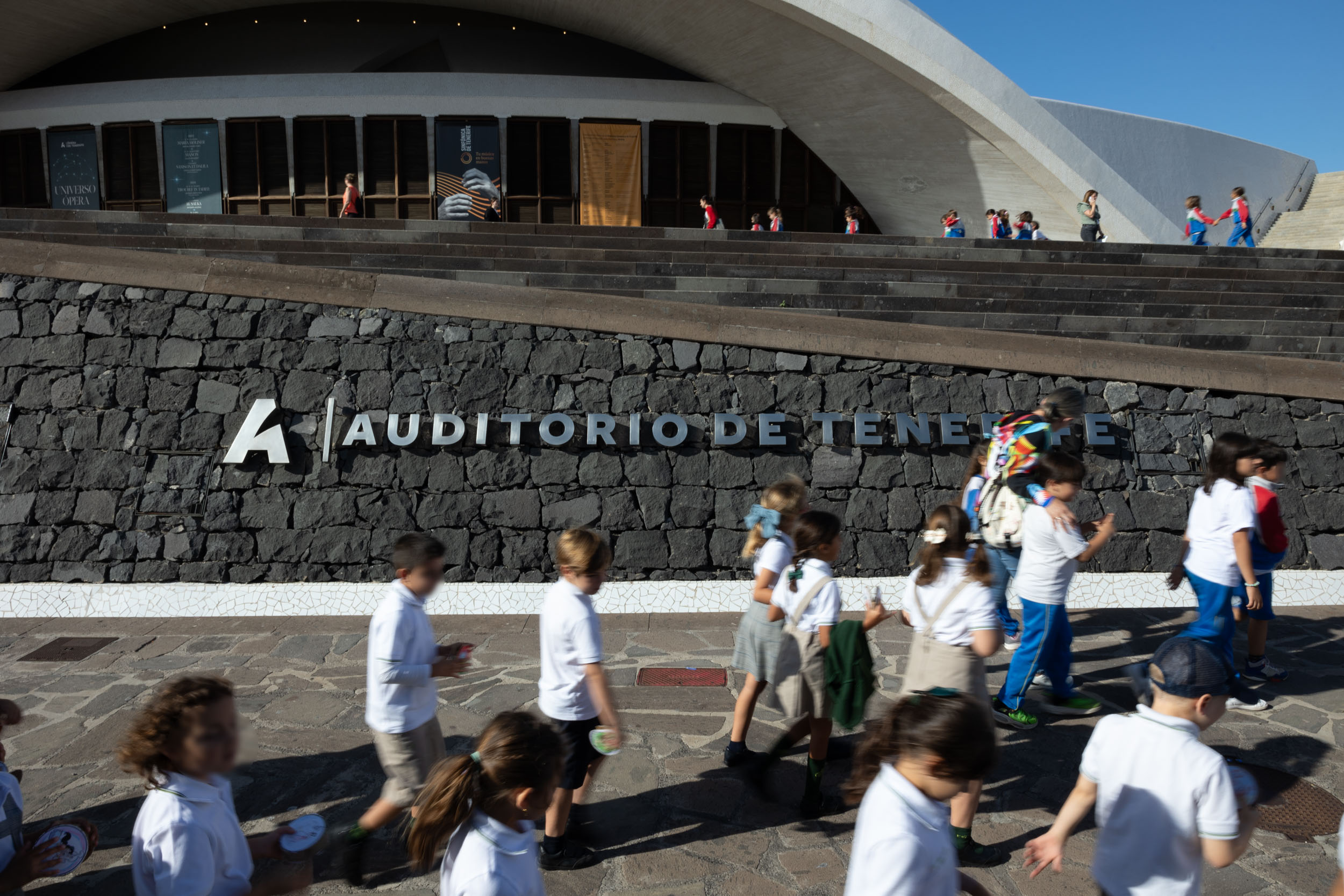THE EDUCATIONAL AND SOCIAL DEPARTMENT WAS OF BENEFIT TO 26,130 PEOPLE

Performances for school and social centres, educational visits and mediation activities make up the programme
The Educational and Social Department of the Auditorio de Tenerife benefitted a total of 26,130 people during the season that has just ended. They participated in the activities carried out by the project, which involved the Culture and Education departments of the Tenerife Island Council. The proposal comprised shows for schools and social centres, classroom performances, teaching guides, mediation activities, online meetings with teachers, didactic guides, educational resources and educational and technical guided visits from October 2023 to June 2024.
The Culture of the Island Council delegate, José Carlos Acha, considers «the work that the Auditorio de Tenerife carries out in this area to be fundamental. It is necessary to reach new audiences in the activities we propose, and for this, we reach all ages in this line of work, both with educational centres and with social groups.»
Acha also explained that «the proposal offered is very varied. It also reflects the diversity that the shows organized by Auditorio de Tenerife have.» The regional minister highlighted that the actions promoted by the Educational and Social Department are not only carried out in the Auditorio; sometimes they take place in the facilities of the educational centres.
The educational concerts and shows offered to the schools and social centres on the island that took place at the Auditorio de Tenerife amounted to 29 performances, attaining 17,921 attendees. To be highlighted are those of the Sinfónica de Tenerife (El circo de don Nicanor for the youngest, Cuentan las voces for Primary and Abemón for Secondary Education Level) and the family title programmed by Ópera de Tenerife each year (El niño y los sortilegios, by Maurice Ravel).
The Teatro en la Escuela (Theatre at School) programme consists of a public call for entries for theatre and dance companies and musical groups, which —after a selection process through a committee of experts—results in a catalogue. 11 companies were included in this year, offering their performances and activities to schools and social centres on the island. In total, 5,608 spectators enjoyed 90 shows and a dozen sessions of creative processes in 100 centres of 24 island municipalities.
The Escuelas de Teatro (Theatre Schools) program was spread across nine municipalities on the island, teaching 174 students divided into age groups. On the other hand, Teatro Aficionado(Amateur Theatre), which promotes this art among cultural associations, programmed more than 25 performances by nine groups from the island.
The artistic and social project Danza en Comunidad celebrated its tenth anniversary. The anniversary was celebrated with a meeting in the Auditorio attended by a hundred professionals and collectives who have been involved in the program’s activities over the past decade.
The educational guided visits took place for the second consecutive season. This cross-disciplinary educational activity consists of carrying out a process of training and informing the public during school hours. It is meant for all levels and aims to give rise to autonomous and critical students. It involves a visit to the building and a series of workshops for the different educational levels in a specific classroom for this audience, which reached 428 pupils. In addition, educational, technical guided visits were also given to 88 students to show them the building.
Caja de Música (Music Box) was presented as the first digital project in Spain carried out by a public cultural institution. The project focuses on providing teachers with artistic and musical resources that enrich students' experiences at all stages of their education. This project follows the criteria of the Department of Education of the Government of the Canary Islands. Generally, it adheres to the fundamental strategic guidelines defined by the Sustainable Development Goals (SDGs) for practical and quality education. Twelve professionals from different educational, cultural and musical sectors are testing the new tool.
Mediation activities were also carried out with pupils from the island and with groups such as the ONCE Foundation. There was also a workshop on mediation and creative processes in charge of mediator Beatriz Bello and multidisciplinary artist Checho Tamayo. The aim was to provide companies and professionals in music, dance and theatre, through consensus work, with curricular and artistic tools for the development of creative processes. 40 professionals from companies participating in the Teatro en la Escuela programme and companies from the catalogue of the Network of Municipal Performing Arts Venues (REEM) of Tenerife attended.
Another of the new programmes implemented is Prevenidos, whose objective is to bring live music and performing arts closer to the students of Baccalaureate and training cycles. Through this initiative, 1,735 people from educational and social centres on the island could enjoy a first-class cultural option while understanding the artistic and technical intricacies of the Auditorio's shows through resources created by the area.
The Educational and Social Department of the Auditorio de Tenerife is associated with RESEO European Network for Opera, Dance and Music Education and the Spanish Network of Organisers of Educational Concerts (ROCE). The department was created to bring arts and creative processes to all citizens, with a particular focus on school pupils and people at risk of social exclusion.
One of the objectives is to nurture the relationship between artistic and cultural activities and how they are conveyed to society and to encourage space for building a relationship between art and people. Its main idea is for art to make an unquestionable contribution to social well-being, the recognition of individual and collective identity, training, and critical thinking needed for mature democratic social coexistence.


